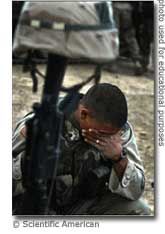Military Chaplain: Different War, Different Stress
 What are some of the differences between this war and others that have been fought in the past, and how do those differences add to or subtract from the possible after effect known as posttraumatic stress disorder? One military chaplain answered these questions recently. Although the report is a few months old, the information is still timely and relevant.
What are some of the differences between this war and others that have been fought in the past, and how do those differences add to or subtract from the possible after effect known as posttraumatic stress disorder? One military chaplain answered these questions recently. Although the report is a few months old, the information is still timely and relevant.
Click on 'Article Link' below tags for more...
From the American Forces Press Service:Chaplain: Different War Imposes Different Stresses
By Jim Garamone
FORWARD OPERATING BASE LOYALTY, Iraq, Dec. 18, 2005 – A different kind of war produces different kind of stresses on the servicemembers fighting it, said the 2nd Brigade Combat Team chaplain here. But recognizing those stresses enables the soldiers of this 3rd Infantry Division unit to begin to deal with them, said Chaplain (Maj.) Peter Brzezinski.
Brzezinski, a Presbyterian minister, called uncertainty the greatest stress to the brigade's troops. "Every time you go out the gate, there is the chance that something will happen," he said.
Brigade soldiers work with Iraqi security forces but also patrol East Baghdad on their own. Soldiers moving off the FOB stand the chance of being engaged by suicide bombers, suicide car bombers and small-arms fire. Improvised explosive devices are the big killers in this war, and enemy fighters are constantly changing their tactics and procedures. A route near the FOB has a reputation for being laced with IEDs. "I know it's stupid, but every time I go on (the route), I keep wondering if this is the last thing I'll see," said one soldier.
Soldiers here operate far differently than in 2003, during their initial run up to Baghdad at the beginning of Operation Iraqi Freedom. The rules of engagement are far more restrictive, as troops recognize they need to be. In many cases, the soldiers are working in jobs they never received formal school training to carry out. For example, field artillerymen work as infantrymen and air defense artillery soldiers, as military police. "They've done very well in these new jobs," Brzezinski said. "This is a great, flexible force, but it does provide stress."
Even soldiers on the FOB have combat stress uncertainty. Rocket and mortar attacks, while rare, are a possibility. On the FOB, people don't even look up when they hear the occasional rifle or machine gun fire off base.
Uncertainty in an institutional sense also contributes to the problem, the chaplain said. Army researchers who did a survey at the FOB found the lack of predictability in deployments to be the greatest concern to soldiers. "If the Army could say, 'you will be home for this period and then on this date you will deploy,' the soldiers would be much happier," Brzezinski said. "Not knowing is a stressor on the troops."
Access to the Internet and efforts at Fort Stewart, Ga., the brigade's home, help reduce concerns about family, the chaplain said. The FOB's Internet Café, which enables soldiers to stay in touch via e-mail, Web cams and instant messaging, is packed at all hours. "Of course, if there is an incident here, then the infrastructure here is quickly overloaded," he said.
Also helping reduce stress is a sense of accomplishment. Brigade soldiers feel they are doing a good job with the Iraqi security forces and see daily progress in the region around their base, the chaplain said. "And everyone here is very proud of the way the elections went," he said. "When you feel good about your mission, you can put up with a lot."
The brigade's year-long deployment is drawing to a close. The 506th Brigade Combat Team from Fort Campbell, Ky., is replacing the 2nd Brigade. While the 506th is part of the 101st Airborne Division-remembered as the "Band of Brothers" of World War II and for operations at Hamburger Hill in Vietnam--it will serve as part of the 4th Infantry Division.
As the brigade goes home, the chaplain will work with unit commanders and top NCOs to make sure the soldier's reintegration with their families goes smoothly. The unit will arrive back in Georgia, reunite with their families, go through a week-long decompression routine, then start a month of block leave. "Then we will come back and begin the process all over again," Brzezinski said.
Posted in its entirety for educational purposes.
Related Posts


